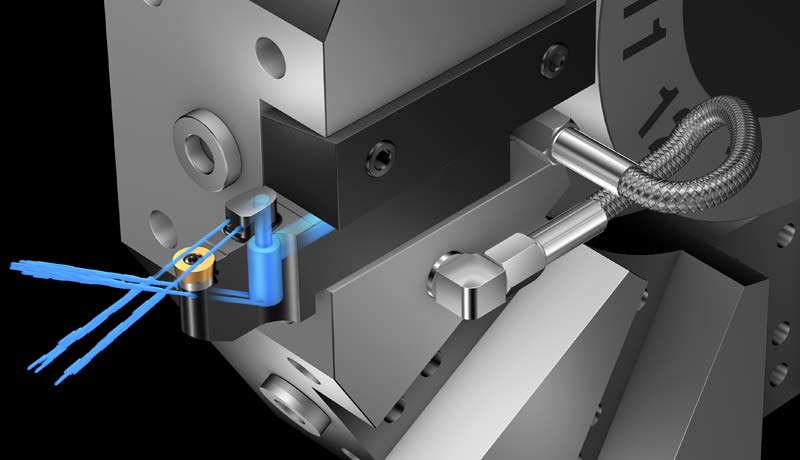Fuelling India’s ascent
How advanced machining technologies are fuelling growth in India’s aerospace market
Aerospace scientist and eleventh President of India, Abdul Kalam, famously said that “Dreams transform into thoughts, and thoughts result in action.” This philosophy captures the spirit of India’s aerospace sector, which is poised to become the world’s third-largest aviation market by December 2025. But to sustain this momentum, continued progress in component production and supply chain efficiency are essential. Here Sunil Joshi, President of Sales, India, at metal cutting specialist Sandvik Coromant, explores how advanced machining technologies are reinforcing the country’s position in the global aerospace market.
For decades, India’s aerospace industry faced significant challenges that hindered its global competitiveness, from dependence on imported technologies to inefficiencies in manufacturing processes.
However, government-led initiatives such as Make in India and the Production Linked Incentive scheme have significantly transformed this landscape over the past decade. These initiatives have incentivised domestic manufacturing, encouraged foreign direct investment and promoted skill development, resulting in a thriving aerospace ecosystem.
Today, India is home to one of the fastest-growing aviation maintenance, repair and overhaul (MRO) industries, expected to drive MRO advancements across the Asia-Pacific region. What’s more, global original equipment manufacturers such as Boeing, Airbus and Rolls-Royce are increasingly sourcing critical components from India, recognising the country as a reliable supply chain partner. There are also signs of indigenous innovation, with Tamil Nadu, Karnataka and Maharashtra emerging as key regional aerospace hubs.
To sustain growth and remain globally competitive, India’s aerospace manufacturers must tackle two key challenges: improving supply chain efficiency and enhancing component quality. Adopting advanced machining technologies and digital solutions could play a crucial role in overcoming these obstacles.
Advancing components
Across the aerospace industry, there has been a growing shift toward using advanced materials such as titanium and heat resistant superalloys (HRSAs) for aircraft components. These materials are essential because they reduce overall component weight while maintaining strength, resulting in lighter, more fuel-efficient aircraft that lower operating costs and reduce environmental impact
For India, the ability to manufacture aerospace components from these advanced materials is critical to supporting its ambitions of becoming a global aerospace hub. However, these materials present significant machining challenges due to their hardness, heat resistance and propensity for rapid tool wear.
Advanced machine tools are essential for overcoming these challenges and ensuring the production of high-precision, high-quality components.
Turning tools such as Sandvik Coromant’s CoroTurn® 107 and CoroCut® 2 with their wear-resistant S205 and GC1205 grades provide the toughness needed to maintain stability during long machining cycles, reducing tool changes and ensuring consistent performance in demanding environments. This is especially important when machining turbine discs and spools, where maintaining tight tolerances and achieving high-quality surface finishes is critical.
Similarly, milling tools like the CoroMill® Plura HD/HFS, the CoroMill® 316 in GC1745 and GC1710 grades and the CoroMill® MS20 in S30T, S40T and 2040 grades offer the rigidity and chip control required for efficient roughing and finishing of titanium and superalloys. By minimising tool wear and part distortion, these tools enhance machining efficiency and support the production of critical components such as turbine blades, spools and shafts.
While milling is essential for internal features, edge milling plays also crucial in aero frame assembly, where composites must fit precisely to ensure strong bonds and structural integrity. The CoroMill® Plura Router (2P350 series) is designed for this purpose, delivering clean, accurate edges, ensuring reliable bonding, fastening and long-term durability in aero-frame assembly.
Alongside edge milling, drilling is equally important in aero frame assembly, creating the precise holes essential for proper assembly and component alignment. The CoroDrill® 862-GM with veined polycrystalline diamond (PCD) is ideal for drilling HRSAs and composites. The veined PCD structure, with channels within the diamond, improves heat dissipation and wear resistance, maintaing precision and extending tool life.
However, as the aerospace manufacturing ecosystem grows, it is vital that advancements in component production are supported by a strong, resilient supply chain.
Strengthening supply chains
In February 2025, Huw Morgan, senior vice president of Aerospace Procurement at Rolls-Royce, stated: “India is the best solution to supply chain challenges. Our engine volumes are growing at around 20%, and traditional supply chains can’t support it.” This statement reflects a broader trend in which disruptions in Western supply chains position India as a key partner for aerospace components.
Minimising downtime, extending tool life and maintaining consistent quality is critical to meeting delivery like timelines and controlling costs. Smart machining technologies are proving indispensable in addressing these challenges, offering real-time data and actionable insights that optimise operations and improve production efficiency.
Platforms such as Sandvik Coromant’s CoroPlus® MachiningInsights empower manufacturers by enabling predictive maintenance and process optimisation. With real-time monitoring and predictive analytics, MachiningInsights tracks tool performance, detects potential wear and adjusts machining parameters before disruptions occur. This proactive approach extends tool life and ensures uninterrupted, high-quality production.
Other elements of CoroPlus® can support more efficient aerospace manufacturing. For instance, with ToolGuide, manufacturers receive recommendations on tools and provides cutting data, optimising machining. Furthermore, ToolLibrary provides production engineers, CAM programmers and machine operators with a library of over 900,000 cutting tool items. This capability saves time when choosing the correct cutting tool and preparing tool assemblies, optimising production.
The integration of smart machining solutions strengthens collaboration between OEMs and suppliers by providing transparent, real-time production data, reducing lead times and ensuring that aerospace components meet exacting standards. Such operational agility, coupled with predictive maintenance, can help position India as a trusted supplier of high-quality aerospace components in an increasingly competitive global landscape.
As India continues to advance its aerospace capabilities, transforming ambition into action, as Abdul Kalam envisioned, will be the key to success. Advanced machining technologies are improving supply chain efficiency and the quality of components. This progress not only meets growing global demand but also positions India to exceed international standards, turning its aspirations into reality and strengthening its competitive edge in the global aerospace market.


